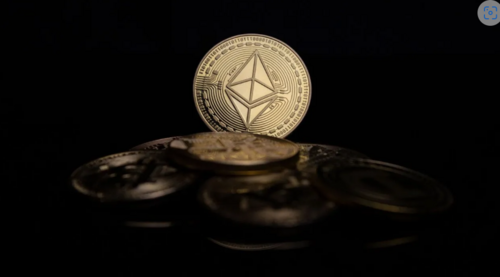
By Andrew Asmakov and Liam J. Kelly

Ethereum is the second-largest cryptocurrency by market capitalization. Image: Shutterstock.
Analysts at Glassnode estimate that roughly 170,000 Ethereum, worth approximately $326 million, will be sold following today's highly anticipated Shanghai upgrade.
The upgrade, also known by its consensus layer name "Capella," will finally let users withdraw ETH that has been locked up on the Ethereum network over the last two years.
Ethereum began its transition to a proof-of-stake network in December 2020, enabling validators and other interested stakers to begin earning passive rewards on ETH pledged to the network. It completed the transition last September following the "merge," an upgrade that combined the Ethereum mainnet with the proof-of-stake beacon chain.
Users who've staked their Ethereum, however, haven't been able to withdraw their initial deposits or rewards. But all that changes later today.
Glassnode researchers today stated in a report that of the newly unlocked sum, approximately 70,000 ETH will come from validators exiting the network, pulling their staked holdings with them. The report indicates that there are 253 depositors waiting to do precisely this, but analysts added that "withdrawals are most likely related to a change in their technical setup, rather than exiting their position."
The remaining 100,000 ETH is expected to come from users withdrawing their staking rewards to sell on the market. Glassnode analysts said they only expect roughly $133 million worth of ETH to "actually become liquid" following the activation of withdrawals.
Proof-of-stake networks work by having validators secure the network, as opposed to miners on proof-of-work blockchains like Bitcoin. Anyone can become a validator on Ethereum by staking 32 ETH (roughly $60,000) and begin earning rewards for doing so. If a validator acts maliciously, they face a penalty known as "slashing" that deducts ETH from their staked sum.
Despite projecting upwards of $326 million in Ethereum potentially hitting the market, Glassnode's report concludes that the move "is expected to be a lot less dramatic than many have painted it to be," adding that should the Shanghai upgrade go off without a hitch, it "will bolster a growing staking industry."
It's also worth noting that withdrawal requests will enter a queue, and not all withdrawal requests will be processed on day one. Individual stakers may have to wait at least two or three days before receiving their funds, and stakers making use of pooling services such as Lido or centralized providers like Coinbase might need to wait weeks if not months. This means that any ETH being withdrawn from the staking contract won't hit the market all at once.
Other analysts, including CoinShares research associate Marc Arjoon, agree that the effects of Shanghai on the Ethereum market will likely be muted in the short term.
Arjoon told Decrypt that this has a lot do with liquid staking solutions such as Lido Finance
Though withdrawals for Lido Finance are also contingent on withdrawals on Ethereum also becoming available, users have been able to swap their staked Ethereum tokens (stETH) for ETH on exchanges like Curve Finance.
When depositing Ethereum on a liquid staking platform, users get an equivalent staked version of Ethereum that can be used elsewhere in the world of decentralized finance (DeFi), such us non-custodial lending and trading platforms.
"If those takers wanted to exit the market, they could simply sell their tokens on the secondary market for a one-to-one ratio," he told Decrypt.
Arjoon also believes that many of the "tech-savvy" stakers who have the 32 ETH needed to become validators are unlikely to sell their stashes.
"They decided to stake their ETH with an indefinite lockup period, and that's likely because they believe in using ETH as a store of value," said Arjoon. "That’s why I also think that that cohort majority is unlikely to sell.”
So who's dumping their staked ETH? "Different entities like businesses, colleges, and other things that just can't be identified using the [wallet] addresses," are the most likely to sell, said Arjoon. "To be conservative, I would say that 50% of those entities would withdraw and sell their ETH."
DISCLAIMER
THE VIEWS AND OPINIONS EXPRESSED BY THE AUTHOR ARE FOR INFORMATIONAL PURPOSES ONLY AND DO NOT CONSTITUTE FINANCIAL, INVESTMENT, OR OTHER ADVICE.